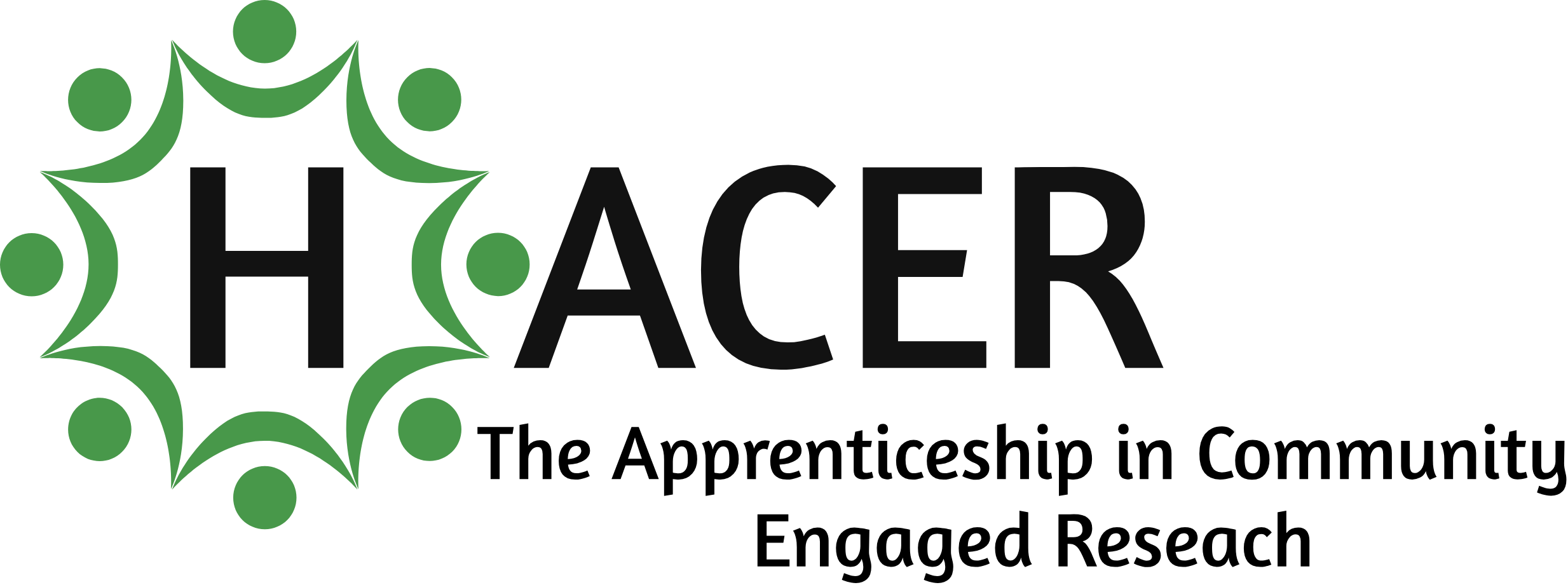The Apprenticeship in Community-Engaged Research Program provides undergraduate students with a variety of opportunities to participate in community learning and scholarship. Through classes and experiential learning opportunities, (H)ACER trains students in participatory research methodologies and creates opportunities for students to work in real world contexts. In collaboration with our community partners, students engage in projects that address pressing issues such as social, economic, educational, and environmental injustice through an approach that seeks to honor the cultural, social and epistemological strength of community members.
As students move through the HACER internships and classes, they may become eligible for a Colleges Nine or John R. Lewis College Leadership Certificate or a Pathways to Academic Distinction Award.
Some opportunities for undergraduates include:
- JRLC 35: Knowledge and Justice (5 units): This course serves as an introduction to the (H)ACER program at John R. Lewis College and the ideas and practices of critical research. (H)ACER trains students in participatory research methodologies and prepares students to work in real world contexts addressing issues such as social, economic, educational, and environmental injustice. Students gain a foundation in understanding the context of the research university and developing critical and relational strategies for working with communities. Students grapple with questions of how to be in and with communities in an ethical way and to build relationships that both recognize and are not foreclosed by histories of violence, with particular attention to race, class, gender, and nationality. Course fulfills general elective Ethnicity and Race (ER). Offered Fall Quarter.
- JRLC 30: (H)ACER Internships (2-units): Students may work in an after school garden enrichment program and support programming in the one-acre school and community garden or work with a local community based organization affiliated with (H)ACER. Check Program Schedule for Internship Availability.
- Re-Thinking Service Learning: Alternative Spring Break (2-units): The five day student-led experience from the Saturday of spring break to the following Wednesday,provides a unique experience for UCSC students to participate in intergenerational and intercultural dialogue and learn about the rich and complicated geopolitical histories of Santa Cruz County. Offered Spring Quarter. Informational sessions start in the third week of winter session. Students must attend an informational session to apply.
- JRLC 135: Community-Engaged Research Methodologies (5-units). This course takes a holistic approach in familiarizing students about how to effectively and ethically conduct community engaged research, from contextualized understandings of power and knowledge to hands-on training in various methodologies through a class project. The topical focus of the course varies (e.g. sustainability, water justice, educational equity etc.). Offered Winter Quarter.
- Leadership Positions: Students have the opportunity to apply for paid positions to run the following programming:
- Calabasas Community Garden and Elementary School Liaison: Students coordinate with (H)ACER staff and faculty to support a one-acre community-led garden, and coordinate events such as All Hallows Eve, the Harvest Festival and the Day of the Child. Students also coordinate with (H)ACER staff to support the after school program and facilitate undergraduates running an enrichment program in spring quarter.
- Alternative Spring Break Co-Leads: Students work with (H)ACER staff and faculty to organize and lead a week long class with local organizations centered on educational equity and environmental, and economic justice.
- College Nine and John R. Lewis College Garden Club Leads: Students work with (H)ACER staff to organize and lead club meetings and maintain our colleges’ community garden.
(H)ACER Undergraduate Researcher: Students who advance through the (H)ACER Program may also join community-engaged research labs to support and contribute to research projects throughout the year. Students may apply after completing JRLC 135.
Community Research Labs: We develop deep partnerships with a select few schools and community organizations and support social justice oriented practices and programs at these sites (called ‘community research labs’). Our research projects and community sites are tied together through the following themes: education, schooling, Land, environment, food and imagining sustainable futures.

